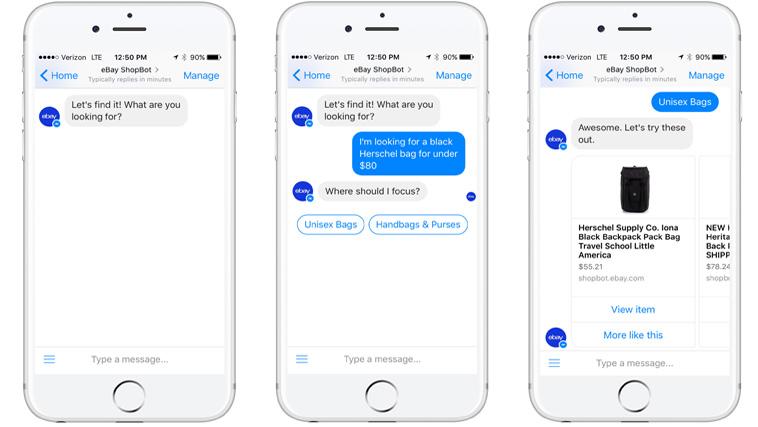The e-commerce industry has acquired an inconceivable place in the global marketplace. E-commerce has broadened the horizon for retailers, and the competition is becoming more challenging. Therefore, every e-commerce store owner looks out for an USP to drive as many customers to their business. Chatbots are among such USPs that make your e-commerce brand successful with a promise to offer a better shopping experience, customer support, and quick replies to sales queries.
Chatbots in a Nutshell
Chatbots are interactive computer programs that simulate human conversations through an event-driven programming or AI-based machine learning. The ones powered by natural language processing (NPL), machine learning and AI are the most popular among the e-commerce entrepreneurs. As they can automate business processes by sending and receiving text messages and filtering and fetching data from automated systems, the application of AI chatbots in e-commerce is no less than a wondrous adventure.
The AI-based e-commerce chatbots are revolutionizing the businesses by providing a faster and better customer experience than human counterparts. Brands use chatbot integrations to communicate with customers and resolve multiple issues on their online stores. Gradually, chatbots have become no less than the backbones of businesses in the e-commerce industry.
They are helping e-commerce stores to engage their audiences, providing them with relevant, quick, and data-driven solutions for issues. Let’s not forget how AI-driven chatbots allow businesses to offer continuous support 24/7, driving better sales through a guided e-commerce shopping experience. With seamless integration with your CMS, e-commerce platform, CRM software, and the ERP solutions, AI-powered e-commerce chatbots can provide heightened customer experiences through quick data-driven replies to queries.
Chatbots are the future of marketing. They have evolved from a mere marketing tool to a valuable asset for driving successful e-commerce business activity. Here, we’ll examine how chatbots can help your customers to increase the overall number of sales.
The Role of Chatbots in e-Commerce:
The purpose of an e-commerce bot in business is to create a loyal customer base through the best possible customer support and enhanced user experience. Many e-commerce and retail businesses have been already using AI-powered e-commerce chatbots to boost their business.
- Chatbots are the most efficient conversational agent because they identify the requirement of the customers through event-driven programming or AI-based learning.
- They help in recognizing the typing pattern of every customer and establish a quick conversation accordingly.
- They can track the buyer’s browsing behavior and history to suggest relevant products to repeat buyers or visitors.
4 Ways Chatbots Can Improve e-Commerce Sales and Customer Service
1. Personalize the customer experience
The flexibility of chatbots allows them to engage customers on different levels. They act as a resource to a customer by giving sales information, technical support, and many more types of replies.
The chatbots are programmed on different technical, humorous, and friendly verticals to keep customers engaged with the brand.
Re-marketing is the most powerful tool in online marketing to increase revenue from sales. The one-to-one conversation through chatbots makes a seamless path to push customers into the conversion funnel and generate sales from repeated customers. By tracking the purchase history and recent browsing behavior, chatbots give suggestions for new items or services by setting matches between the products. These recommendations can also be done based on specific conversations between the customers and a chatbot.
An efficient e-commerce chatbot can use the same data to upsell certain products with enhanced recommendations. The same data also lets them cross-sell related products and increase the overall cart value by influencing the customers’ buying intent positively.
2. Strengthening customer service
Customers often need solutions to their queries outside of business hours. They seek out answers even while the customer service staff members are unavailable.
Customers can have a conversation with chatbots at any time as the chatbots are available 24/7, 365 days of the year. Chatbots have eliminated complaints about the customer service process through interactive voice response (IVR) systems during phone calls. Chatbots try to lead the customers with a definite answer.
Chatbots can attend to many consumers in different situations without human help. You can stop investing money in customer support executives, as the chatbots provide advanced support.
Chatbot integration also improves the scaling of the customer service department. They can integrate both IVR and text models to handle customer support from all verticals. With seamless integration with your existing ERP and CRM software, AI chatbots can offer quick replies to even data-intensive queries from customers.
3. Improving business efficiency
Besides interacting with customers and providing them with better service, live chatbots can also be programmed to keep the track of your store’s inventory.
They provide awareness about a specific item that is out of stock and help inform customers that the products they were searching for have come back in the stock. They also give assistance to regular business operations that otherwise consume a lot of time and effort through manual processing. Moreover, they ensure an error-free inventory management without any manual intervention.
Chatbots improve efficiency by providing fast and helpful services to each customer. They can essentially act as a self-service support tool to provide straightforward answers to customers instantaneously. The manual team can focus on other complex issues that a chatbot can’t solve. Thus, it has become a priority for every enterprise to use chatbot services in all levels.
Chatbots have brought revolutionary changes in automation to help an audience engage with your brand. They can be used to send private messages to all contacts when you launch a new collection, announce a new brand, or want to send wishes. This is because messenger chatbots can lead your campaigns to a 98% open rate. They can do this by capturing leads and email data from various forms on the site or mobile app. Just think about how you can automate email newsletters to show customers items in their wish lists. The same process will take ages if you are manually sending emails to each customer according to their respective wish lists.
With many automation possibilities, chatbots reduce the organization’s operational cost to a great extent. A simple AI bot can automate almost 30% of the tasks that are performed by customer service agents and other staff. For example, you can integrate an e-commerce bot programmed in multiple languages, which will eliminate the need for outsourcing customer service staff to other countries. By eliminating this language barrier, an efficient chatbot can increase your business’s overall productivity.
4. Guiding users for a better outcome
We have already discussed how AI chatbots help to provide efficient and personalized services. Many companies use chatbots to attract more potential buyers to their online store.
According to a recent survey by Chatbot developer Helpshift, 70% of users resolved their issues over instant chat without requiring calls or emails to manual customer support. The survey also found that 67% of users reduced the time it took to explain the problem to an agent.
The methods of handling customer support through calls are so vapid and time-consuming. On the other hand, chatbots accomplish much-needed tasks by resolving issues with streamlined customer support.
They play the role of a sales associate addressing the customer’s concern. They help shoppers to make purchasing decisions more quickly.
For example, eBay has started using chatbot technology by piloting a Facebook messenger bot to remind customers that an auction listing is about to end. eBay has a virtual personal shopping assistant named SpotBot that helps the customer find the items they are searching for. It helps the customers to find styles, match their preferences and helps to resolve relevant questions to find the perfect fit, style, and color.

Chatbots chat with humans via a live chat interface. For example, coffee giant Starbucks uses chatbots to facilitate sales and find information. It uses artificial intelligence chatbots to supplement human employees in an innovative conversational ordering system for its mobile app called “My Starbucks Barista.”
Takeaway
It is very crucial to build a digital marketing strategy while running an e-commerce business. Chatbots help companies stand out from their competitors and prove to be innovative and attentive to users’ needs. Chatbots in e-commerce serve as an effective way of improving market and sales growth. They also help to increase the performance for a better response from users.




